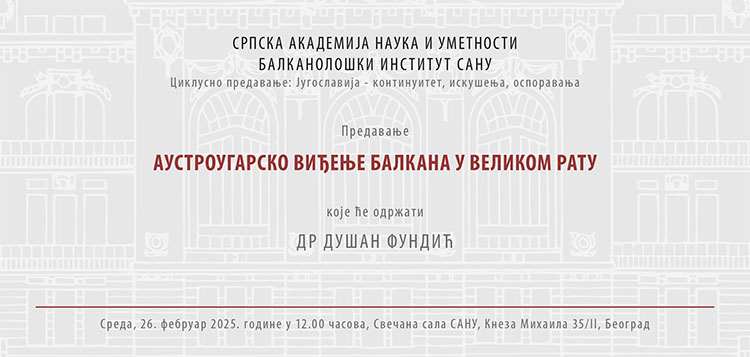Lecture of Dr Dušan Fundić – Austro-Hungarian Perspective on the Balkans in the Great War
The lecture series titled ’Yugoslavia – Continuity, Trials, and Challenges’ launches with the talk ’Austro-Hungarian Perspective on the Balkans in the Great War’ by Dušan Fundić, PhD. The lecture will take place on Wednesday, 26 February, at the SASA Grand Hall, at noon. The Institute for Balkan Studies SASA and the Serbian Academy of Sciences and Arts organize the series.
Dušan Fundić is a senior research associate of the Institute for Balkan Studies SASA and a recipient of the Waclaw Felczak and Henryk Wereszycki Award for the best book in Central European history in the past three years presented by Jagiellonian University in Krakow and the Polish Historical Society. He will discuss the basic concepts of decision makers in foreign policy in Austro-Hungary on the Balkans and its future during the First World War. The aspect of the south-Slavic question and the significance of the east coast of the Adriatic Sea in the Vienna strategic plans will be particularly explored along with the Dual Monarchy’s aspirations for hegemony over the Balkans—or at least its western regions—as a primary war objective.
In order to put the topics mentioned above within a suitable research framework, the lecturer will build on the importance of circumstances present as a consequence of the complex internal organization of Austria-Hungary, shedding light on who the actual decision-makers were. This is especially related to the importance of the rift and conflicts between the Ministry of Foreign Affairs and the Austro-Hungarian Supreme Command as well as the existing factions within the mentioned bodies. Particular attention will be given to the role of the ‘Hungarian factor’ in shaping foreign policy, the inter-dependence of internal and foreign politics of Austria-Hungary and mutual pressure and rivalries among allies – Germany, Austria-Hungary and Bulgaria which had a significant impact on the Balkans plan development.
In addition to the mentioned topics, the pivotal role of 1914 as a basis for the new framework of Balkan Peninsula understanding within the Dual Monarchy will be examined. This will offer an analysis of the preconceptions and prejudices held by the Austro-Hungarian elite toward Balkan states and peoples, as well as their unique development during the Great War.

